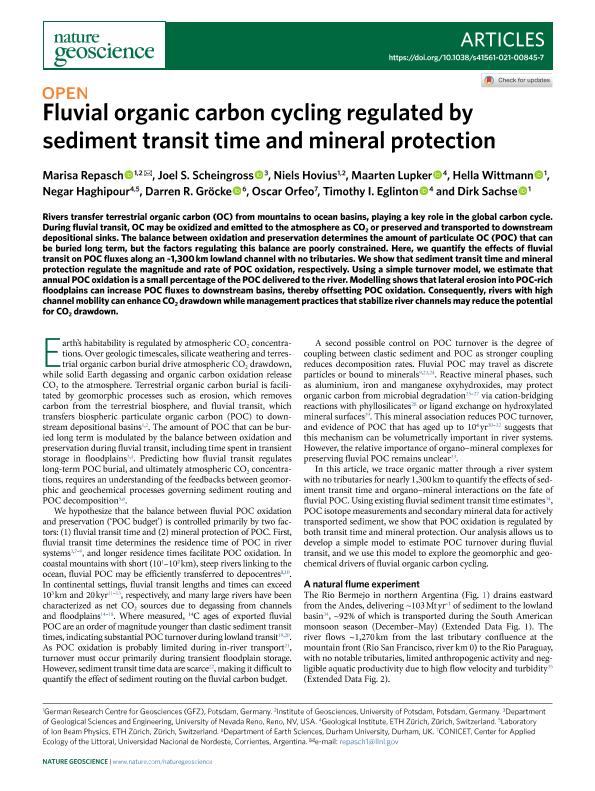Artículo
Fluvial organic carbon cycling regulated by sediment transit time and mineral protection
Repasch, Marisa; Scheingross, Joel S.; Hovius, Niels; Lupker, Maarten; Wittmann, Hella; Haghipour, Negar; Gröcke, Darren R.; Orfeo, Oscar ; Eglinton, Timothy I.; Sachse, Dirk
; Eglinton, Timothy I.; Sachse, Dirk
 ; Eglinton, Timothy I.; Sachse, Dirk
; Eglinton, Timothy I.; Sachse, Dirk
Fecha de publicación:
11/2021
Editorial:
Nature Publishing Group
Revista:
Nature Geoscience
ISSN:
1752-0894
Idioma:
Inglés
Tipo de recurso:
Artículo publicado
Clasificación temática:
Resumen
Rivers transfer terrestrial organic carbon (OC) from mountains to ocean basins, playing a key role in the global carbon cycle. During fluvial transit, OC may be oxidized and emitted to the atmosphere as CO2 or preserved and transported to downstream depositional sinks. The balance between oxidation and preservation determines the amount of particulate OC (POC) that can be buried long term, but the factors regulating this balance are poorly constrained. Here, we quantify the effects of fluvial transit on POC fluxes along an ~1,300 km lowland channel with no tributaries. We show that sediment transit time and mineral protection regulate the magnitude and rate of POC oxidation, respectively. Using a simple turnover model, we estimate that annual POC oxidation is a small percentage of the POC delivered to the river. Modelling shows that lateral erosion into POC-rich floodplains can increase POC fluxes to downstream basins, thereby offsetting POC oxidation. Consequently, rivers with high channel mobility can enhance CO2 drawdown while management practices that stabilize river channels may reduce the potential for CO2 drawdown.
Palabras clave:
ORGANIC CARBON
,
FLUVIAL ENVIRONMENT
,
SEDIMENT TRANSIT
,
BERMEJO RIVER
Archivos asociados
Licencia
Identificadores
Colecciones
Articulos(CECOAL)
Articulos de CENTRO DE ECOLOGIA APLICADA DEL LITORAL (I)
Articulos de CENTRO DE ECOLOGIA APLICADA DEL LITORAL (I)
Citación
Repasch, Marisa; Scheingross, Joel S.; Hovius, Niels; Lupker, Maarten; Wittmann, Hella; et al.; Fluvial organic carbon cycling regulated by sediment transit time and mineral protection; Nature Publishing Group; Nature Geoscience; 14; 11; 11-2021; 842-848
Compartir
Altmétricas



